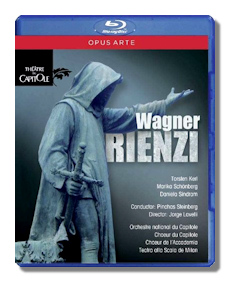
The Internet's Premier Classical Music Source
Related Links
- Wagner Reviews
- Latest Reviews
- More Reviews
-
By Composer
-
Collections
DVD & Blu-ray
Books
Concert Reviews
Articles/Interviews
Software
Audio
Search Amazon
Recommended Links
Site News
 Blu-ray Review
Blu-ray Review
Richard Wagner

Rienzi
- Torsten Kerl - Rienzi
- Marika Schoenberg - Irene
- Daniela Sindram - Adriano
- Richard Wiegold - Colonna
- Stefan Heidemann - Orsini
- Robert Bork - Cardinal Orvieto
- Marc Heller - Baroncelli
- Leonardo Neiva - Cecco del Vecchio
- Jennifer O'Loughlin - Peace Messenger
Choeur du Capitole
Choro dell'Accademia Teatro alla Scala de Milan
Orchestre National du Capitole/Pinchas Steinberg
Stage Director - Jorge Lavelli
Recorded Live October, 2012 at Theatre du Capitole, Toulouse
Opus Arte Blu-ray OABD7125D 176m (opera) + 55m (bonus tracks) LPCM DTS
Also available on DVD OA1110D: Amazon - UK - Germany - Canada - France - Japan
Performances of Rienzi typically feature a good many cuts, usually reducing the opera by a third to more than a half. That might sound as though the conductors and stage directors historically have been a little too aggressive with the scalpel. But consider the fact that the 1842 premiere reportedly lasted six hours! An authentic or definitive score of the opera seems not to exist: the original Rienzi manuscript was apparently destroyed, courtesy of Wagner admirer Adolf Hitler who had it with him in his bunker in 1945 when the advancing Russians were sweeping through Berlin.
The most complete recording of Rienzi came in 1976 and was led by the late Sir Edward Downes – it lasted about four hours and forty minutes! This new performance on Opus Arte has a duration of nearly three hours. An overly truncated version, you're thinking? Well, taking into account the fact that Wagner supplied a plethora of choruses, preludes, postludes, marches and other music not really integral to the story, one can see there is a strange sort of dichotomy here: the more music you get, the more art you lose.
After viewing this version of Rienzi, I can confidently opine that it serves the work well, hardly conveying a sense that the opera is padded or bloated. Moreover – and more importantly – it makes its case quite convincingly because the performances overall are excellent.
Rienzi portrays the story of the 14th century Roman Cola di Rienzi, who gets involved in the conflict between the Colonna and Orsini families, both of noble background. In his actions here and with the people's struggle against the nobility, he gains support of the Church. However, after averting an assassination attempt, he becomes a target of both the people and Church, owing to the bloodshed from putting down an uprising wherein the Colonna and Orsini family leaders are killed. Rienzi, along with his sister Irene and Adriano (her lover), die in a fire at the Capitol building set by the nobles.
Torsten Kerl as Rienzi is simply splendid. He knows the role well, having recorded it in 2010 with the Deutsche Oper on the Arthaus Musik label, issued on both DVD and Blu-ray. That version, by the way, was twenty minutes shorter than this one! Marika Schoenberg as Irene is also very good here, as is Daniela Sindram in the trouser role of Adriano. The remainder of the cast is fine as well and the chorus and orchestra perform quite convincing, not least because of the excellent leadership of conductor Pinchas Steinberg, whose spirited tempo selections and deft shaping of the score infuse the opera with a momentum that rarely lets up.
What is a little odd about this production are the historical film clips interspersed throughout performance of the Overture. They include scenes of protest and unrest in Europe and elsewhere, dating from pre-World War II up to current times, including the 1990 fall of the Berlin Wall. Obviously, they are used to signify historical struggles between the people and ruling classes. The sets on stage are sparse and lacking in color, though ultimately effective and atmospheric. Characters appear in whiteface makeup throughout and, in an adroitly imaginatively stroke, the Plebes and Patricians are rather indistinct from each other: either of their causes would seem as justifiable or as unworthy as the other.
The camera work, picture clarity and sound reproduction are exceptionally fine to round out this excellent issue. The bonus tracks feature some interesting interviews with cast members, stage director Jorge Lavelli, conductor Pinchas Steinberg and artistic director of the Capitole Toulouse, Frédéric Chambert. For those interested in Wagner and mid-19th century opera, this is probably a must.
Copyright © 2013, Robert Cummings


















